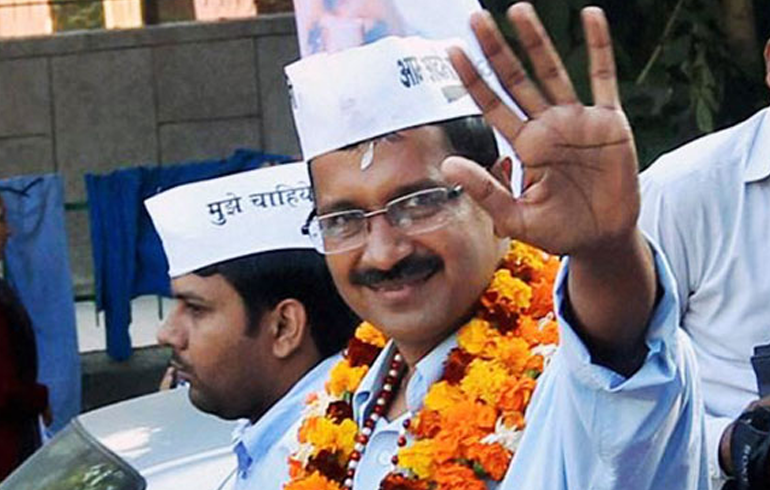Delhi Chief Minister Arvind Kejriwal looks to be heading back to power as early results show a big win for his party in the Indian capital.
The Aam Aadmi Party (AAP) is leading in more than two-thirds of the 70 seats.
Delhi voted on 8 February after an aggressive campaign that pitted the AAP against India’s governing Bharatiya Janata Party (BJP).
The results are a setback for the BJP after it won a landslide in general elections last year.
The latest results show the AAP either winning or leading in 63 seats, while the BJP is ahead in just seven.
“This is a win for Mother India,” a grinning Mr Kejriwal told his supporters at the AAP office. He waved and blew them kisses, and said he “loved the people of Delhi”.
The 51-year-old former bureaucrat rose to political fame as an anti-corruption campaigner. He first became chief minister in 2013 and was then re-elected in 2015 with a landslide. He has been credited with turning around Delhi’s government-run schools, establishing affordable neighbourhood clinics and providing cheap water and electricity.
He has also consistently campaigned for greater autonomy for the state, as control of its police force and land still rest with the federal government.
“It’s not just my win. This is a win for every family whose children are now getting a good education in school, whose family members are getting good treatment in hospitals,” he said.
Mr Kejriwal is leading a victory parade from the AAP office to the Hanuman temple in the city centre, after saying his party’s victory was a blessing from Hanuman, the monkey god.
Celebrations are underway outside the AAP office where party workers told BBC Hindi the win vindicates their decision to campaign hard on “governance and development”, and refrain from “divisive politics”.
The BJP’s campaign saw heavyweights such as Home Minister Amit Shah take to the Delhi streets to woo voters but that appears to have had little impact on the outcome.
The party relied on its Hindu nationalist rhetoric, criticising a peaceful gathering of thousands in Shaheen Bagh – a largely Muslim neighbourhood in Delhi – which has been protesting against India’s controversial new citizenship law, known as the Citizenship Amendment Act (CAA).
Many Indians say the law discriminates against Muslims.
Will the Delhi election have a larger impact and hurt the BJP’s prospects?
Soutik Biswas, BBC News, Delhi
There is no clear evidence yet. Many believe the BJP’s “single-track” muscular nationalist campaign is creating a climate of anxiety, insecurity and exhaustion at a time when India is actually a secure nation. They say this brand of stridently nationalist politics draws attention away from the serious economic slowdown in the country. But what’s clear is that Mr Modi remains India’s most popular leader and his base is still largely intact.
What Mr Kejriwal’s victory does is offer a breather to a largely divided and demoralised opposition – and it proves that good governance wins votes.
BJP leaders painted the protesters at Shaheen Bagh – largely comprising Muslim women – as dangerous traitors who wanted to break up the country. And they alleged that the AAP was supporting them, a tactic which did not chime with voters.
On Tuesday women, men and children held a silent protest at Shaheen Bagh, many wearing black gags around their mouths, reports the BBC’s Rajini Vaidyanathan who was at the vigil.
The BJP has only marginally improved its tally from 2015 when they won only three seats as the AAP swept to victory.
The Congress party, which won no seats last time, appears to have drawn a blank this time too.
At last year’s general election the BJP won all seven parliamentary constituencies in Delhi.




















































